英语基础句型转换大盘点
小学英语句型转换整理
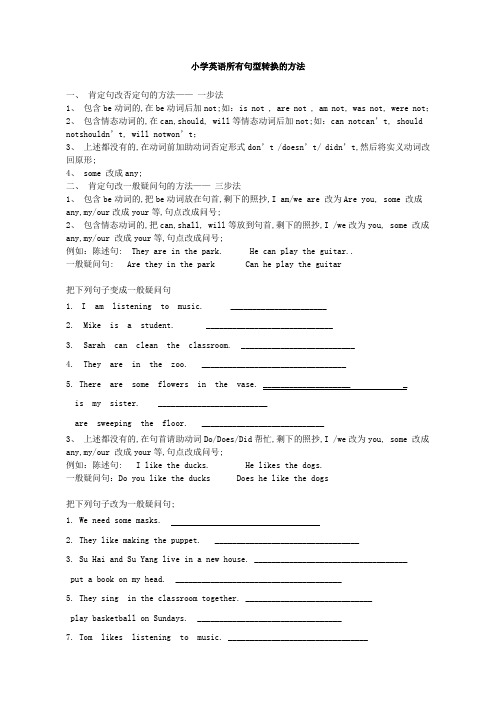
小学英语所有句型转换的方法一、肯定句改否定句的方法——一步法1、包含be动词的,在be动词后加not;如:is not , are not , am not, was not, were not;2、包含情态动词的,在can,should, will等情态动词后加not;如:can notcan’t, should notshouldn’t, will notwon’t;3、上述都没有的,在动词前加助动词否定形式don’t /doesn’t/ didn’t,然后将实义动词改回原形;4、 some 改成any;二、肯定句改一般疑问句的方法——三步法1、包含be动词的,把be动词放在句首,剩下的照抄,I am/we are 改为Are you, some 改成any,my/our改成your等,句点改成问号;2、包含情态动词的,把can,shall, will等放到句首,剩下的照抄,I /we改为you, some 改成any,my/our 改成your等,句点改成问号;例如:陈述句: They are in the park. He can play the guitar..一般疑问句: Are they in the park Can he play the guitar把下列句子变成一般疑问句1. I am listening to music. ______________________2. Mike is a student. _____________________________3. Sarah can clean the classroom. __________________________4. They are in the zoo. _________________________________5. There are some flowers in the vase. ____________________ _is my sister. _________________________are sweeping the floor. ____________________________3、上述都没有的,在句首请助动词Do/Does/Did帮忙,剩下的照抄,I /we改为you, some 改成any,my/our 改成your等,句点改成问号;例如:陈述句: I like the ducks. He likes the dogs.一般疑问句:Do you like the ducks Does he like the dogs把下列句子改为一般疑问句;1. We need some masks.2. They like making the puppet. _________________________________3. Su Hai and Su Yang live in a new house. ___________________________________put a book on my head. ______________________________________5. They sing in the classroom together. _____________________________play basketball on Sundays. _________________________________7. Tom likes listening to music. ________________________________三、肯定句改特殊疑问句的方法——四步法1、句首添加特殊疑问词根据划线部分确定是什么疑问词;2、划线部分去掉;3、把剩下的句子按照改一般疑问句的方法改完;特例:How many询问数量后紧接物品,EG: How many kites can you see/ How many books are there on the desk 等4、查补某些特殊的句型需要添词或减词;句号改成问号;句型转换题1. The girl is singing in the classroom.改为否定句改为一般疑问句2. They are looking for bag.对画线部分提问3. I am riding my bike now.同上4. There are twelve studens over there.同上5. I can speak English.改为一般疑问句6. I am writing now.同上7. I have a desk and a chair.用He做主语改写句子8. She is buying some food in the supermarket.改为否定句9. I am ill. 对画线部分提问10. Does she like growing flowers 给予否定回答11. I will make model planes with my classmates on Sunday. 对画线部分提问12. The girl dances beautifully.改为感叹句13. The waiter and the waitress play table tennis every day. 改为否定句14. The boy is standing on the man's shoulders.改为一般疑问句15. It's ten o'clock.对画线部分提问关于特殊疑问词组针对人提问谁 /何人 who 地点何地 where 原因 why时间何时 when what time 方式方法程序怎样 how年龄 how old 体重 how heavy 长度 how long 身高 how tall可数名词问多少 How many 不可数名词问多少,多少钱 How much东西职业事物什么 what颜色 what color 时刻 what time选择某一个 which练一练1、A: _______ is the boy in blue B:He’s Mike.2、A: _______ pen is it B:It’s mine.3、A: _______ is the diary B:It’s under the chair.4、A: is the Chirstmas DayB: It’s on the 25th of December.5、A: _______ are the earphones B:They are 25 yuan.6、A: _______ is the cup B:It’s blue.7、A: _______ is it today B:It’s Sunday.8、A: _______ was it yesterday B: It was the 13th of October.9、A: _______ this red one B:It’s beautiful.10、A: Can I have some paper and some crayonsB: _______ A: I want to make a kite.12、A:_______ is your cousin B: He’s 15 years old.13、A:_______ do you have dinnerB: At 6 o’clock.1.He does well in Maths. 改为否定句2.Mike runs as fast as Ben. 改为一般疑问句3.I get up at six thirty every day. 用yesterday morning every day is good at English and Maths. 对画线部分提问5.Ben runs fast. I run faster. 两句合并为一句6. The policeman caught the thief. 改为一般疑问句,作否定回答7.He is thirty kilos. 对画线部分提问8.Turn right at the third crossing. 改为否定句9.Are they American cars 改为单数10.Don’t go along this street.改为肯定句11.Give the purse to me. 换一种说法,句意不变12.The policeman caught the thief. 改问现在进行时13. I get to the shopping center by bus. 对画线部分提问14.It always rains in summer there. 改为一般疑问句,作肯定回答15.It’s cold in winter there. 对画线部分提问16.I like autumn best. 改为否定句17.Su Yang is asking Ben some questions. 对画线部分提问18.Please turn off the light. 改为否定句know his telephone number. 改为一般疑问句20.The children have school today. 改为否定句’d like to join them.改为一般疑问句are going to see a film tomorrow. 对画线部分提问like collecting stamps and singing. 改为否定句24.He often cleans his bedroom. 改为一般疑问句25. Liu Tao is watering flowers in the garden. 对画线部分提问26.David and Mike are going to planting trees this afternoon. 对画线部分提问27.He did his homework in the classroom. 改为否定句Bing is heavier than Gao Shan. 对画线部分提问jumps as far as Mike. 改为否定句see a man behind me. 改为一般过去时boy can jump higher than the girl. 改为否定句is hot in summer in New York. 对画线部分提问34.Liu Ting needs some pencils. 改为否定句35.She is an English girl. 变为复数36.They are our women doctors. 变为单数37.Mary can fly. 变为一般疑问句,并作否定回答38.I like playing football. 改成第三人称单数he39.He has a brother. 改为一般疑问句40.Nancy drew some pictures yesterday. 改为否定句41. Liu Tao usually reads newspaper. 改为过去时1.The children had a good time in the park. 否定句:______________________________2.一般疑问句:_____________________________________3.2. There were about nine hundred people at the concert音乐会. 否定句:_____________________________________ 一般疑问句:_____________________________________ 对划线部分提问:____________________________________4.There was only one problem. 否定句:_____________________________________一般疑问句:_____________________________________肯定/否定回答:____________________________________5.Ann did her homework yesterday evening. 否定句:_______________________________一般疑问句:_____________________________________对划线部分提问:____________________________________st week I read an English book. 否定句:_____________________________________一般疑问句:_____________________________________肯定/否定回答:____________________________________ 对划线部分提问:____________________________________7.My brother was in the park just now. 否定句:__________________________________一般疑问句:_____________________________________ 肯定/否定回答:____________________________________ 对划线部分提问:____________________________________8.She had some bread for lunch today. 否定句:____________________________________ 一般疑问句:_____________________________________肯定/否定回答:____________________________________9.They read English last night. 否定句:__________________________________________ 一般疑问句:________________________________________ 肯定/否定回答:____________________________________ 对划线部分提问:____________________________________。
五年级英语句式转换20道

五年级英语句式转换20道1. 陈述句:I am a student. 一般疑问句:Are you a student? 解析:陈述句变一般疑问句,第一人称I 要变为第二人称you,am 变为are。
2. 陈述句:He likes apples. 一般疑问句:Does he like apples? 解析:陈述句主语是第三人称单数,且动词是likes,变一般疑问句时要借助does,likes 变回原形like。
3. 陈述句:They are happy. 一般疑问句:Are they happy? 解析:be 动词直接提前。
4. 陈述句:She has a pen. 一般疑问句:Does she have a pen? 解析:has 是have 的第三人称单数形式,变一般疑问句要借助does,has 变回have。
5. 陈述句:We play football. 一般疑问句:Do you play football? 解析:陈述句主语是we,变一般疑问句要变为you,借助do。
6. He likes apples. (改为否定句)答案:He doesn't like apples.解析:主语是第三人称单数,否定句要用doesn't,后面动词用原形。
7. They are happy. (改为否定句)答案:They aren't happy.解析:are 的否定形式是aren't 。
8. I have a pen. (改为否定句)答案:I don't have a pen.解析:主语是第一人称,否定句用don't 。
9. She can sing. (改为否定句)答案:She can't sing.解析:can 的否定形式是can't 。
10. We play football on Sundays. (改为否定句)答案:We don't play football on Sundays.解析:主语是复数,否定句用don't 。
英语语法句型转换大全
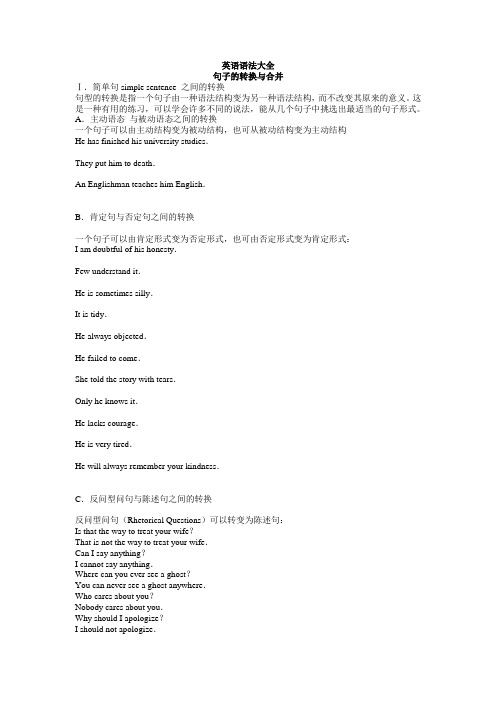
英语语法大全句子的转换与合并Ⅰ.简单句simple sentence 之间的转换句型的转换是指一个句子由一种语法结构变为另一种语法结构,而不改变其原来的意义。
这是一种有用的练习,可以学会许多不同的说法,能从几个句子中挑选出最适当的句子形式。
A.主动语态与被动语态之间的转换一个句子可以由主动结构变为被动结构,也可从被动结构变为主动结构He has finished his university studies.They put him to death.An Englishman teaches him English.B.肯定句与否定句之间的转换一个句子可以由肯定形式变为否定形式,也可由否定形式变为肯定形式:I am doubtful of his honesty.Few understand it.He is sometimes silly.It is tidy.He always objected.He failed to come.She told the story with tears.Only he knows it.He lacks courage.He is very tired.He will always remember your kindness.C.反问型问句与陈述句之间的转换反问型问句(Rhetorical Questions)可以转变为陈述句:Is that the way to treat your wife?That is not the way to treat your wife.Can I say anything?I cannot say anything.Where can you ever see a ghost?You can never see a ghost anywhere.Who cares about you?Nobody cares about you.Why should I apologize?I should not apologize.D.不同词类之间的转换几乎任何词类都可以转换为另一词类。
七年级英语句式转换30道

七年级英语句式转换30道1. 陈述句:She is a student. 疑问句:Is she a student? 解析:陈述句中有be 动词is,变为一般疑问句时将is 提到句首,句末用问号。
2. 陈述句:They are in the classroom. 疑问句:Are they in the classroom? 解析:陈述句中有be 动词are,变为一般疑问句时将are 提到句首。
3. 陈述句:I am happy. 疑问句:Am I happy? 解析:陈述句中有be 动词am,变为一般疑问句时将am 提到句首,注意第一人称I 变为第二人称you 时,be 动词要用are。
4. 陈述句:He likes apples. 疑问句:Does he like apples? 解析:陈述句中动词likes 是第三人称单数形式,变为一般疑问句时要借助助动词does,likes 变回原形like。
5. 陈述句:We play football on Sundays. 疑问句:Do we play football on Sundays? 解析:陈述句中动词play 是原形,变为一般疑问句时借助助动词do。
6. 陈述句:The dog runs fast. 疑问句:Does the dog run fast? 解析:陈述句中动词runs 是第三人称单数形式,变为一般疑问句时借助助动词does,runs 变回原形run。
7. 陈述句:My father works hard. 疑问句:Does my father work hard? 解析:陈述句中动词works 是第三人称单数形式,变为一般疑问句时借助助动词does,works 变回原形work。
8. 陈述句:She has a pen. 疑问句:Does she have a pen? 解析:陈述句中has 是have 的第三人称单数形式,变为一般疑问句时借助助动词does,has 变回原形have。
中考英语丨初中英语句型转换大全

中考英语丨初中英语句型转换大全展开全文一、陈述句与疑问句、祈使句、感叹句间的转换1、陈述句中肯定句变为否定句,大部分是用not来改变谓语结构,但也有借用否定意义的词,如nothing, nobody, none, neither, little, few, never, hardly等,例如:A:T om does well in maths.B:Tom doesn't do in maths.A:He has much to do.B:He has nothing to do.A:All of my classmates like art.B:None of my classmates likes art.2、改为疑问句。
根据上下句的结构和词的减少,来判断变为哪一种形式的疑问句。
例如:A:My brother often has breakfast at school.B: Does your brother often have breakfast at school?A:T om's already weak in English.B:Tom's already weak in English, isn't he ?A:The red light changes every two minutes.B:How often does the red light change?3、改为感叹句。
根据所给的句子结构和单词的词性,来确定使用哪一种感叹句的形式,例如:A:This is an interesting book.B:What an interesting book this is!或 How interesting this book is!二、同义句转换。
根据上句,写出一个意思相同(或相近)的下句,此类形式繁多,内容复杂,涉及面广,归类如下:1、同义词或词组之间的转换。
小学英语句型转换技巧汇总

小学英语句型转换技巧汇总一、肯定句改否定句1.在be动词/情态动词(can/should/will/may等)后+not 肯定句:I am a student.否定句:I am not a student.肯定句:You are sad.否定句:You are not sad.肯定句:I can swim.否定句:I can not swim.肯定句:You will go to the park.否定句:You will not go to the park.2.在动词前加助动词否定形式don't/doesn't/didn't①当句中的动词是原形时,加don't。
肯定句:I like English.否定句:I don't like English.肯定句:You have dinner.否定句:You don't have dinner.②当句中的动词是第三人称单数时,用doesn't+词原形。
肯定句:She likes singing.否定句:She doesn't like singing.肯定句:She does her homework.否定句:She doesn't do her homework.③当句中的动词是过去式时,用didn't+动词原形肯定句:We had a great time during our holidays.否定句:We didn't have a great time during our holidays.3.当出现动词have/has时,应分情况讨论。
①当have表示“某人有什么的时候”,其否定形式为have not/has not.肯定句:She has two books.否定句:She has not two books.②当have作为实意动词时,其否定形式为do not have/does not have.肯定句:You have dinner.否定句:You do not have dinner.③当have在完成时中作为助动词时,其否定形式为have not/has not.肯定句:I have seen this film.否定句:I have not seen this film.4.肯定陈述句中的some/too,在否定陈述句中应改为any/either。
小学英语【常考句型转换】方法大全
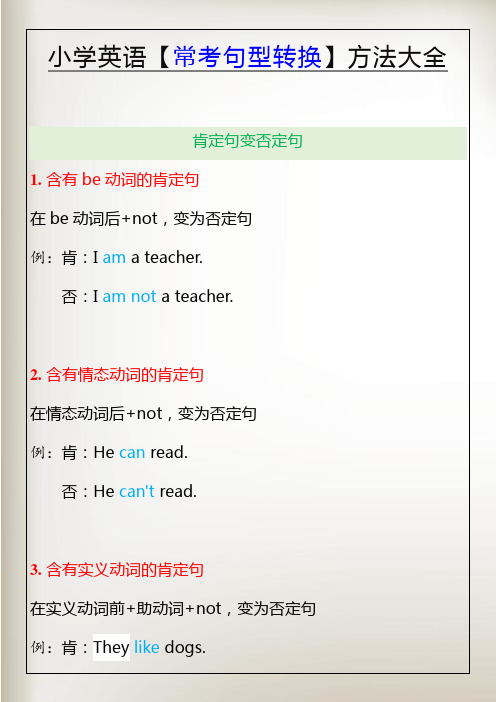
小学英语【常考句型转换】方法大全
肯定句变否定句
1.含有be动词的肯定句
在be动词后+not,变为否定句
例:肯:I am a teacher.
否:I am not a teacher.
2.含有情态动词的肯定句
在情态动词后+not,变为否定句
例:肯:He can read.
否:He can't read.
3.含有实义动词的肯定句
在实义动词前+助动词+not,变为否定句
例:肯:They like dogs.
否:They don't like dogs.
4.肯定句中含有some时
变为否定句,除了+not,还要把some变成any
例:肯:There are some books in the bag.
否:There are n't any books in the bag.
肯定句变一般疑问句
1.含有be动词的肯定句
把be动词提到句首,其它照搬,句号变问号碰到第一、二人称时,要互换。
例:肯:I am a teacher.
否:Are you a teacher?
2.含有情态动词的肯定句
把情态动词提到句首,其它照搬,句号变问号。
小学六年级英语句型转换方法归纳大全
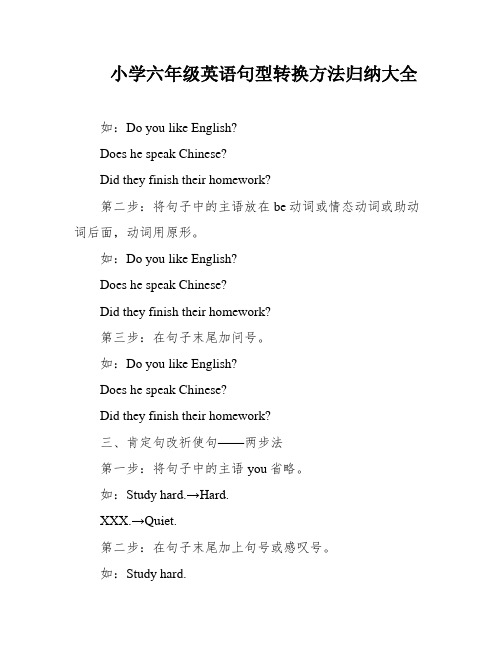
小学六年级英语句型转换方法归纳大全如:Do you like English?Does he speak Chinese?Did they finish their homework?第二步:将句子中的主语放在be动词或情态动词或助动词后面,动词用原形。
如:Do you like English?Does he speak Chinese?Did they finish their homework?第三步:在句子末尾加问号。
如:Do you like English?Does he speak Chinese?Did they finish their homework?三、肯定句改祈使句——两步法第一步:将句子中的主语you省略。
如:Study hard.→Hard.XXX.→Quiet.第二步:在句子末尾加上句号或感叹号。
如:Study hard.Be quiet!Original article:XXX and I went to the park yesterday。
We played catch and had a ic。
The weather was nice and sunny。
We saw some kids XXX。
We had a great time.Corrected and rewritten:XXX。
my friend and I went to the park。
We played catch and had a ic on the grass。
The weather was beautiful and sunny。
While we were there。
we saw some children flying kites and some people walking their dogs。
It was a wonderful day and we had a lot of fun.When forming a n in English。
英语句型转换1000例

英语句型转换1000例Sentences 1-10:1. Active to Passive: The teacher praised the student. -> The student was praised by the teacher.2. Passive to Active: The ball was hit by the boy. -> The boy hit the ball.3. Simple Present to Present Continuous: He works in a bank. -> He is working in a bank.4. Present Continuous to Simple Present: We arestudying for the test. -> We study for the tests.5. Simple Past to Past Continuous: I went to the park yesterday. -> I was going to the park yesterday.6. Past Continuous to Simple Past: The children were playing in the garden. -> The children played in the garden.7. Simple Future to Future Continuous: I will visit my grandparents next week. -> I will be visiting my grandparents next week.8. Future Continuous to Simple Future: They will be living in London in 2025. > They will live in London in 2025.9. Present Perfect to Present Perfect Continuous: I have finished my homework. -> I have been finishing my homework.10. Present Perfect Continuous to Present Perfect: She has been studying for hours. -> She has studied for hours.Sentences 11-20:11. Active to Passive (Modal): He can play the piano well. -> The piano can be played well by him.12. Passive to Active (Modal): This book must be readby everyone. -> Everyone must read this book.13. Simple Present to Present Perfect: I know the answer. -> I have known the answer.14. Present Perfect to Simple Past: I have already eaten breakfast. -> I ate breakfast already.15. Past Continuous to Past Perfect: While I was sleeping, the phone rang. -> While I had been sleeping, the phone rang.16. Past Perfect to Past Continuous: After he had finished his work, he went home. -> After he had been finishing his work, he went home.17. Simple Future to Future Perfect: He will have graduated by next year. -> He will graduate by next year.18. Future Perfect to Simple Future: I will have eaten dinner by 7 pm. -> I will eat dinner by 7 pm.19. Present Perfect to Present Perfect Continuous (Negative): I haven't seen him lately. -> I haven't been seeing him lately.20. Present Perfect Continuous to Present Perfect (Negative): She hasn't been working on the project. -> She hasn't worked on the project.Sentences 21-30:21. Active to Passive (With Phrasal Verb): He turnedthe light on. -> The light was turned on by him.22. Passive to Active (With Phrasal Verb): The door was knocked on by the children. -> The children knocked on the door.23. Simple Present to Present Continuous (Continuous Action): He often plays basketball. -> He is playing basketball now.24. Present Continuous to Simple Present (State Action):I am understanding this concept well. > I understand this concept well.25. Simple Past to Past Continuous (Interrupted Action):I was reading a book when the phone rang. -> I interrupted reading a book when the phone rang.26. Past Continuous to Simple Past (Completed Action): We were watching a movie until it ended. -> We watched a movie until it ended.27. Simple Future to Future Continuous (Emphatic Future): I will definitely be studying tomorrow. -> I will be studying tomorrow without fail.28. Future Continuous to Simple Future (Question): Will you be working on the project tomorrow? -> Are you going to work on the project tomorrow?29. Present Perfect to Present Perfect Continuous (Perfect Continuous): I have been studying all day. -> I have studied all day.30. Present Perfect Continuous to Present Perfect (Perfect): She has been working on her thesis for a year. -> She has worked on her thesis for a year.Sentences 31-40:31. Active to Passive (With Indirect Object): He gave the book to me. -> I was given the book by him.32. Passive to Active (With Indirect Object): The money was sent to him by his father. -> His father sent him the money.33. Simple Present to Present Perfect (Experiential Perfect): I have lived in many countries. -> I have had the experience of living in many countries.34. Present Perfect to Simple Past (Narrative Perfect):I told him everything. -> I told him everything in the story.35. Past Continuous to Past Perfect Continuous: As I was walking home, it started to rain. -> As I had been walking home, it started to rain.36. Past Perfect Continuous to Past Continuous: BeforeI left, I had been working on my project for hours. -> Before I left, I was working on my project for hours.37. Simple Future to Future Perfect Continuous: By next year, he will have been living here for 10 years. -> By next year, he will have lived here for 10 years without interruption.38.。
英语语法句型转换大全

英语语法大全句子地转换与合并Ⅰ.简单句之间地转换句型地转换是指一个句子由一种语法结构变为另一种语法结构,而不改变其原来地意义.这是一种有用地练习,可以学会许多不同地说法,能从几个句子中挑选出最适当地句子形式.资料个人收集整理,勿做商业用途.主动语态与被动语态之间地转换一个句子可以由主动结构变为被动结构,也可从被动结构变为主动结构..资料个人收集整理,勿做商业用途..肯定句与否定句之间地转换一个句子可以由肯定形式变为否定形式,也可由否定形式变为肯定形式:.资料个人收集整理,勿做商业用途...........反问型问句与陈述句之间地转换反问型问句()可以转变为陈述句:.?.?.?.?..不同词类之间地转换几乎任何词类都可以转换为另一词类.可以是:.动词与名词间地转换:..资料个人收集整理,勿做商业用途...动词与形容词之间地转换:.....动词与副词间地转换:....名词与形容词间地转换:.,.资料个人收集整理,勿做商业用途...名词与副词间地转换:.,...形容词与副词间地转换:,...介词与连词间地转换:....Ⅱ.简单句与复合句之间地转换一个分词、动名词、不定式或介词短语可以转换为复合句,反过来也如此:—,.,.,...,.,.,.,..Ⅲ.简单句与复杂句之间地转换一个词或是短语可以转变为名词从句、定语从句或状语从句,反过来也如此:.名词从句......资料个人收集整理,勿做商业用途....定语从句-...-.-....状语从句.资料个人收集整理,勿做商业用途,..资料个人收集整理,勿做商业用途.,.' .,...大部分短语不仅可以变为并列地分句,也可以变为状语从句.Ⅳ.复杂句与复合句之间地转换...,.,.资料个人收集整理,勿做商业用途.,.,.,.Ⅴ.直接引语和间接引语之间地转换说话人讲地话可以用两种方式来引用.如果引用他地原话,就称作直接引语.因此,“ .”为直接引语.如果按引用人地观点来引用,则称为间接引语.因此.为间接引语.这样地动词称为引话动词,它前面地主语,例如,可称为第一主语.引语中地主语,如及,称为第二主语.引语中地谓语动词称为第二动词.当直接引语转换为间接引语,或间接引语转换为直接引语时,有几个问题需要注意..大写与标点直接引语放在引号之内,第一个字母要大写,引号前加逗号(间或用冒号),引语末加句号、问号或感叹号,但在间接引语中却不加这些.间接引语必须由,()或疑问词(,,等)开头,末尾要加句号.此外,在直接引语中问句可能有倒装语序(助动词放在主语前面),但在间接引语中,问句则需变为自然语序:,“ .”:“ ?”.引话动词与第二动词引话动词可以是,,,,,;,,;,;,;,,,,;,;,,,,;,;,,;,,,;,,等等.若引话动词是现在时或将来时,则当引语由直接变为间接时,第二动词照旧不变.但若引话动词是过去时,则间接引语中地第二动词,就要由现在时变为过去时,由过去时变为过去完成时等.(),“ (,).”()(,).,“ (,).(,)..引话动词与连词.如果间接引语为陈述句,它前面通常都有:,,,,….如果它是问句,它前面通常有:()(),(),(),,;或()+(即疑问词,如,,,,),()+,….如果它是感叹句,它前面通常有:,,….如果间接引语为祈使句,它前面通常有:,,,,,…且里面包含助动词.此外间接引语还可以转换为不定式短语,这时引话动词需要改为宾补动词:.,“ ”.,“ .”.,“ ?”,“ ?”,“ ?”..,“ !”,“!.”,“ !.”资料个人收集整理,勿做商业用途,“!.”.,“ .”,“ .”.代词此外还要注意,把直接引语变为间接引语时,代词需作改变.如果在直接引语中代词为第一人称,在变为间接引语时,将变为与第一主语一致地代词.,“ .”.,“ .”资料个人收集整理,勿做商业用途,“ .”,“ .”,“ .”“ .”(中包括)资料个人收集整理,勿做商业用途如果在直接引语中,代词为第二人称,在间接引语中它将变成与引话动词地宾语一致地人称:,“ .”,“ .”,“ .”,“ .”,“ .”也可看作是宾语:(),“ .”,“ .”引话动词地宾语有时可以省略,但它在间接引语中可能需要说出来:.,“ .”… .如果在直接引语中代词为第三人称,在间接引语中,它可以保持不变:,“ .”,“ .”,“ .”,“ .”(这两个代表两个不同地人)还需指出,上述代词,在直接或间接引语中,可以为任何“格”,而不仅仅是主格:,“ .”“ !”.时间副词(短语)间接引语中地时间副词(短语)可能和直接引语中地时间副词(短语)不同,这是因为原来说话人提到地时间可能与现在引话人提到地时间不同:,“ .”,“ .”().,“ .”().,“ .”().,“ !”()..第一主语及引话动词地位置在新闻报导中第一主语有时放在引话动词地后面:,“…”.,“…”,“…”第一主语及引话动词,除了放在直接引语前面外,还可放在其他位置:,“!.”“!” ,“ .”(但不说)“!,” .(但不说)“!.”(如果大家都清楚这话是谁说地,第一主语及引话动词也可不必说出.)在第一主语及引话动词放在其他位置时,要注意标点符号:,“,;..”“,” ,“ ;..”“,,” ;“ ,.”如果引话动词有较长地修饰语,最好把它放在主语及引话动词前面,如果主语及引话动词在直接引语后面,长修饰语最好放在引话动词后面:,“' .”“' ,” .如果主语和引话动词放在直接引语地中间或后面,作主语地名词可以放在引话动词地后面或前面(若主语是人称代词,只能放在动词后面):“ ,” (,).(很少说)“ !” (,).(很少说)Ⅵ.简单句地合并两个或更多简单句可以合并成一个比较复杂地句子,这种练习对学习写作地人很有好处.两个或更多简单句可借助并列连词合并成一个复合句:.......资料个人收集整理,勿做商业用途两个或更多简单句,可以加上从属连词,把一个或更多句子变为名词从句、定语从句或状语从句,这样来合并成为一个复杂句..变成名词从句:....资料个人收集整理,勿做商业用途?.?..变成定语从句:?....' ..变成状语从句:.,.........两个或更多简单句,也可以把其中一个或更多简单句变成一个短语,甚至一个词,来合并成一个较为复杂地简单句:...(用同位语代替一个句子)..(用介词短语代替句子)..(用“介词动名词”结构代替句子)资料个人收集整理,勿做商业用途..(用不定式代替句子)..(用分词代替句子)资料个人收集整理,勿做商业用途。
小学英语句型转换方法归纳
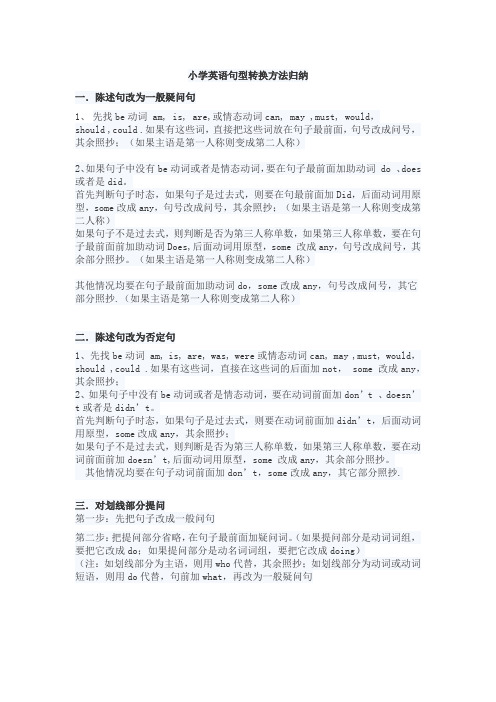
小学英语句型转换方法归纳一.陈述句改为一般疑问句1、先找be动词 am, is, are,或情态动词can, may ,must, would,should ,could .如果有这些词,直接把这些词放在句子最前面,句号改成问号,其余照抄;(如果主语是第一人称则变成第二人称)2、如果句子中没有be动词或者是情态动词,要在句子最前面加助动词 do 、does 或者是did。
首先判断句子时态,如果句子是过去式,则要在句最前面加Did,后面动词用原型,some改成any,句号改成问号,其余照抄;(如果主语是第一人称则变成第二人称)如果句子不是过去式,则判断是否为第三人称单数,如果第三人称单数,要在句子最前面前加助动词Does,后面动词用原型,some 改成any,句号改成问号,其余部分照抄。
(如果主语是第一人称则变成第二人称)其他情况均要在句子最前面加助动词do,some改成any,句号改成问号,其它部分照抄.(如果主语是第一人称则变成第二人称)二.陈述句改为否定句1、先找be动词 am, is, are, was, were或情态动词can, may ,must, would,should ,could .如果有这些词,直接在这些词的后面加not, some 改成any,其余照抄;2、如果句子中没有be动词或者是情态动词,要在动词前面加don’t 、doesn’t或者是didn’t。
首先判断句子时态,如果句子是过去式,则要在动词前面加didn’t,后面动词用原型,some改成any,其余照抄;如果句子不是过去式,则判断是否为第三人称单数,如果第三人称单数,要在动词前面前加doesn’t,后面动词用原型,some 改成any,其余部分照抄。
其他情况均要在句子动词前面加don’t,some改成any,其它部分照抄.三.对划线部分提问第一步:先把句子改成一般问句第二步:把提问部分省略,在句子最前面加疑问词。
五年级下册英语句型转换

五年级下册英语句型转换一、肯定句与否定句转换。
1. be动词(am/is/are)的情况。
- 规则。
- 肯定句变否定句时,直接在be动词后面加not。
- 例句。
- 肯定句:He is a good student.- 否定句:He is not a good student.(缩写为He isn't a good student.)- 练习。
- 肯定句:They are in the park.- 否定句:They are not in the park.(缩写为They aren't in the park.)2. 实义动词(行为动词)的情况(一般现在时)- 规则。
- 如果句子的主语是第三人称单数(he/she/it等),在实义动词前面加doesn't,动词变回原形;如果主语不是第三人称单数,在实义动词前加don't。
- 例句。
- 主语是第三人称单数:She likes apples.- 否定句:She doesn't like apples.- 主语不是第三人称单数:We play football.- 否定句:We don't play football.- 练习。
- 肯定句:He goes to school by bike.- 否定句:He doesn't go to school by bike.- 肯定句:I read books every day.- 否定句:I don't read books every day.二、陈述句与一般疑问句转换。
1. be动词(am/is/are)的情况。
- 规则。
- 把be动词提到句首,句末标点变为问号,第一人称(I/we)变为第二人称(you)。
- 例句。
- 陈述句:I am a teacher.- 一般疑问句:Are you a teacher?- 陈述句:They are at home.- 一般疑问句:Are they at home?- 练习。
小学英语 句型转换(一变二找三换四移)
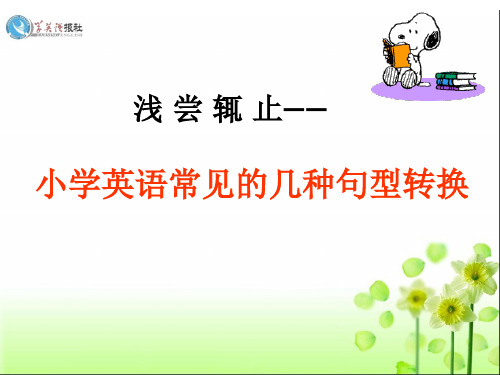
小学英语常见的几种句型转换
题型(一) 变一般疑问句
be动词
be动词有三种形式,他们分别
是:
is am are
Be动词的用法口诀
I (我)用am; you(你)用are, is连着他(he),她 (she) ,它 (it); 单数名词要用is, 复数名词全用are。
情态动词 can (可以 ,能够) will (将要) should (应该)
做 道 一变:先将原句子变为一般问句 题 二找:提问什么事情或事物用what 试 试 三换:用 what 代替划线部分 吧!
四移:将特殊疑问词what 放在句首
She is my si
再 来 一 道 简 单 的!
Is sheis who ? Who she?
一般疑问句的回答 :
• 一般疑问句常用Yes或No回答. • 肯定回答: Yes,主语+be (情态动词、助动词) • 否定回答: No,主语+be (情态动词、助动词)+ not. •
如何将一个肯定的陈述句改为一般疑问句
秘诀一:找be动词或情态动词
看句中有无be动词或情态动词,如 有,把be动词或情态动词提到句首 即可。
一变:先将原句子变为一般问句
二找:提问人用疑问词who 三换:用who 代替划线部分 四移:把who移到句子开头 (大写
再 来 一 道 难 点 的!
The jacket is red red. Is the jacket ? Is the jacket what color? What color is the jacket? 一变:将原句子变为一般疑问句 二找:问颜色用what color
They often go shopping on the weekend. Do Do they they often often go what shopping do on the on weekend? the weekend? What do they often do on the weekend?
(完整版)小学英语基本句子结构与句型转换(最新整理)
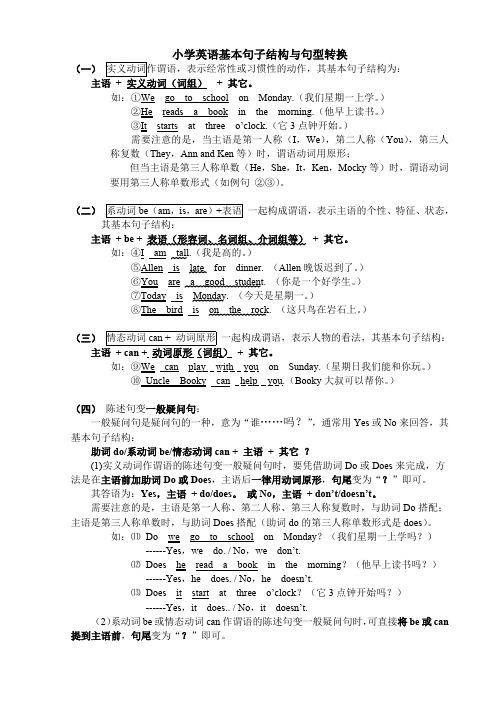
小学英语基本句子结构与句型转换(一)实义动词作谓语,表示经常性或习惯性的动作,其基本句子结构为:主语+ 实义动词(词组)+ 其它。
如:①We go to school on Monday.(我们星期一上学。
)②He reads a book in the morning.(他早上读书。
)③It starts at three o’clock.(它3点钟开始。
)需要注意的是,当主语是第一人称(I,We),第二人称(You),第三人称复数(They,Ann and Ken等)时,谓语动词用原形;但当主语是第三人称单数(He,She,It,Ken,Mocky等)时,谓语动词要用第三人称单数形式(如例句②③)。
(二)系动词be(am,is,are)+表语一起构成谓语,表示主语的个性、特征、状态,其基本句子结构:主语+ be + 表语(形容词、名词组、介词组等)+ 其它。
如:④I am tall.(我是高的。
)⑤Allen is late for dinner. (Allen晚饭迟到了。
)⑥You are a good student. (你是一个好学生。
)⑦Today is Monday. (今天是星期一。
)⑧The bird is on the rock. (这只鸟在岩石上。
)(三)情态动词can + 动词原形一起构成谓语,表示人物的看法,其基本句子结构:主语+ can + 动词原形(词组)+ 其它。
如:⑨We can play with you on Sunday.(星期日我们能和你玩。
)⑩Uncle Booky can help you.(Booky大叔可以帮你。
)(四)陈述句变一般疑问句:一般疑问句是疑问句的一种,意为“谁……吗?”,通常用Yes或No来回答,其基本句子结构:助词do/系动词be/情态动词can + 主语+ 其它?(1)实义动词作谓语的陈述句变一般疑问句时,要凭借助词Do或Does来完成,方法是在主语前加助词Do或Does,主语后一律用动词原形,句尾变为“?”即可。
初一英语语法--句型转换(详细内容)

初一英语语法--句型转换(详细内容)初一英语语法—句型转换内容:陈述句:肯定句否定句疑问句:一般疑问句特殊疑问句一.肯定句变否定句1.句子中有be,在be后加not。
(be动词有am , is , are, was, were)1)I am a student. I am not a student.2)They are blue . They aren’t blue.3) He is Kangkang. He is n’t Kangkang .4) I was ten last year. I wasn't ten yesterday.5) He was good at English. He wasn't good at English.6) They were at home last Sunday. They weren't at home last Sunday.练习:把下列句子变为否定句1.His father is an English teacher._____________________________2.He is crying under the tree. ___________________________ __3.He was thirteen years old two years ago._______________________4.They are very lucky.______________________________________5.t the family was poor.6.My voice was too weak.2.谓语是动词原形,在动词前加don’t。
7.I have a book . I don’t have a book.8.They like Chinese . They don’t like Chinese.9.3) We come from China. We don’t come from China.3.谓语动词是第三人称单数,在动词前加doesn’t,动词用原形。
小学英语1-6年级句型转换大汇总,赶紧让孩子掌握句型百变的技巧吧!

小学英语1-6年级句型转换大汇总,赶紧让孩子掌握句型百变的技巧吧!小学英语中的句型转换属于较难的题型,对孩子的英语综合能力有一定要求。
除了必须掌握基础的词汇外,还要对语法知识和句子语序有很好的掌握,很多孩子在这种题型上失分比较严重,其实是他们没有掌握好方法。
小学英语的句型转换就只有那几种类型,小英告诉你只要掌握了方法,就不怕不会做啦!一、肯定句改否定句的方法1、在be动词后加not。
如:is not , are not , am not2、在can,should, will等后加not。
如:can not, should not,will not;3、上述都没有的,在动词前加助动词否定形式d on’t/doesn’t/didn’t。
4、 some改成any。
如:I am a girl. → I am not a girl.You are a student. →You are not a student.→You aren’t a student.This is Tom’s bag, → This is not Tom’s bag.→ This isn’t Tom’s bag.二、肯定句改一般疑问句的方法1、把be动词放在句首,剩下的照抄,(some 改成any,I改成you,my改成your)句点改成问号。
2、把can,shall, will等放到句首,剩下的照抄,(some 改成any,I改成you,my改成your)句点改成问号。
3、上述都没有的,在句首请助动词Do/Does/Did帮忙,剩下的照抄,(some 改成any,I改成you,my改成your)句点改成问号。
注意:句首的第一个字母要大写,句尾标点应为“?”。
如:I am in Class 6. →Are you in Class 6?You are from America. →Are you from America?It is an orange. →Is it an orange?4、就一般疑问句回答一般疑问句有两种回答,即:肯定回答和否定回答。
句型转换知识点总结

句型转换知识点总结句型转换是英语学习中的一个重要部分,它可以帮助我们扩展句子结构,丰富表达方式,提高语言表达的准确性和流畅度。
在本文中,我们将总结一些常见的句型转换知识点,并提供相应的例子。
1. 主动语态与被动语态的转换主动语态句子的主语是动作的执行者,而被动语态句子的主语是动作的承受者。
转换时需要注意句子结构和动词形式的变化。
例子:主动语态:The teacher praised the student.被动语态:The student was praised by the teacher.2. 直接引语与间接引语的转换直接引语是通过引号将他人的原话直接呈现出来,而间接引语是将他人的原话进行转述并改变时态和人称。
例子:直接引语:He said, "I am going to the party."间接引语:He said that he was going to the party.3. 否定句转换否定句的转换可以通过加入否定副词或使用相应的否定结构来完成。
例子:肯定句:She is studying English.否定句:She is not studying English.否定句转换:I wish she were studying English.4. 疑问句与陈述句的转换疑问句转换为陈述句时,除了要改变词序外,还需要注意动词的形式。
例子:疑问句:Do you like movies?陈述句:You like movies.5. 句子类型转换宣句转换为感叹句或疑问句时,语序和词语会有一定的变化。
例子:宣句:He is a great musician.感叹句:What a great musician he is!疑问句:Is he a great musician?通过以上几个知识点的总结,我们可以更好地理解和应用句型转换,从而提升我们的语言表达能力。
在实际的学习过程中,我们应该多加练习和应用,以提高我们对句型转换的熟练度和灵活运用能力。
- 1、下载文档前请自行甄别文档内容的完整性,平台不提供额外的编辑、内容补充、找答案等附加服务。
- 2、"仅部分预览"的文档,不可在线预览部分如存在完整性等问题,可反馈申请退款(可完整预览的文档不适用该条件!)。
- 3、如文档侵犯您的权益,请联系客服反馈,我们会尽快为您处理(人工客服工作时间:9:00-18:30)。
英语基础句型转换大盘点I. 改写句子:在空白处填入一个适当的词,使该句意思与原句意思相同或相近。
1. Jack is the tallest boy in our class. Jack is taller than ________ other _________ in our class.2. Mrs. Smith is busy now. She is doing her housework at home.Mrs. Smith is __________ __________ her housework at home.3. "Did you have a good sleep last night?" David asked Jim.David asked Jim _________ he _________ well last night.4. The motorbike cost him 8000 yuan last year.He ________ 8000 yuan ________ the motorbike last year.5. He came to the city two years ago. He _________ ________ in the city for two years.6. In our hometown, spring usually lasts from March to May.In our hometown, spring usually starts in March and __________ __________ to May.7. Most children begin school when they are seven.Most children begin school __________ the __________ of seven.8. Uncle Wang has been our neighbour for years.Uncle Wang has lived __________ __________ us for years.9. The digital camera is too expensive for me.I can't __________ to have the digital camera because its price is too __________.10. Mount Qomolangma is the tallest mountain in the world.Mount Qomolangma is __________ than __________ other mountain in the world.11. "Don't play football on your way home,"the teacher said.The teacher told us ___________to play football on your way home.12. I don't think his father knows English. His father hardly knows Enlish.__________he?13. Our city is going to build another Yangtze River bridge this year.Another Yangtze River bridge will be __________in our city this year.14. David's car is more expensive than Bob's.Bob's car is ___________expensive than David's.15. I'll never forget that place; it is there that we met each for the first time.I'll never forget that place_________ we met each for the first time.16. When I saw the great changes in my hometown, I felt very proud._________ the great changes in my hometown, I felt very proud.II. 按要求转换下列句型1. This dress cost her 90 yuan. (一般疑问句)__________ this dress _________ her 90 yuan?2. The TV play is really wonderful. (感叹句)_________ __________ the TV play is!3. The boy in blue is my brother. (就划线部分提问)_________ __________ is your brother?4. Water the young tree often, or it will die. (改为同义句)_________ you don't water the young tree often, it will be__________.5. Tom won' t visit the farm. He'11 stay at home. (改为同义句)Tom will stay at home _________ ________ visiting the farm.6. My brother bought some CDs yesterday. (改为否定句)My brother ___________ __________ any CDs yesterday.7 Mary will come here in ten minutes. (对划线部分提问)_________ _________ will Mary come here?8. We can build a big bridge over the Huangpu River in two years. (改为被动语态)A big bridge can _________ _________ over the Huangpu River in two years.9. We didn’t go to the park last Monday. It rained hard. (保持原句意思)We didn’t go to the park last Monday ________ ________ the heavy rain.10. “Where will you go during the summer holidays?” he asked me. (保持原句意思)He asked me where _________ _________ go during the summer holidays.11. He will be away for long next year. (改为否定句)He be away for long next year.12. This is my box. (改为复数形式)are our .13. The Yellow river is 5,464 kilometres long. (对画线部分提问)__ ___ is the Yellow River?14. Did they have a good journey home? Do you know? (合并为带宾语从句的复合句) Do you know they a good journey home?.15.It took me fifteen minutes to finish the e-mail(电子邮件).( 改为同义句)spent quarter in the e-mail.16. You had better tell him the news. (改为否定句)You had better ________ ________ him the news.17. I write to my aunt twice a month. (对划线部分提问)________ ________ do you write to your aunt?18. Mike drew a picture on the blackboard. (改为被动语态)A picture ________ ________ on the blackboard by Jack.19. There is nothing wrong, ________ ________? (反意疑问句)20. They have learned English for three years. (改为一般疑问句)________ they ________ English for three years?21. Jim’s mother let him watch TV after he finished his homework. (改为同义句)Jim’s mother ________ let him watch TV ________ he finished his homework.22. It’s good for your health to take exercise often. (改为同义句)_________ exercise often can make you __________ .23. I paid 1000 dollars on the new computer. (改错,保持句意不变)_____________________________________________________________________________ 23. The meeting has begun for half an hour. (改错,保持句意不变)______________________________________________________________________________ 23. What’s your favourite subject? (改为同义句)_____________________________________________________________________________ 24. I don’t like Coke. My sister doesn’t like Coke, either. (合并为简单句, 保持句意不变)______________________________________________________________________________ 25. I heard that she was singing at that time. (改为简单句,保持句意不变)_____________________________________________________________________________ 26.Allan goes to the library every Monday.(改为一般疑问句)Allan to the library every Monday?27.The little boys played football on the playground yesterday.(划线部分提问)the little boys football yesterday?28.Let’s go to the English corner, shall we?(改写句子,句意不变)going to the English corner?29.Read more books, and you will get more knowledge.(改写句子,句意不变)The you read, the you will get.30.“When do you have your art lessons?” Mum asked me.(改写句子,句意不变)Mum asked me art lessons.31.After planting the trees you should water them often. (改为被动词态)The trees often after they .同义句转换真题演练1.1)A. "Don' t go to work until you feel well," the doctor said to me.B. The doctor told me________ ________ go to work until I felt well.2) A. Ann spent two weeks getting ready for the exams.B. It________ Ann two weeks to ________ ready for the exams.3) A. Every day, Wang Zhizhi receives E—mails from thousands of basketball fans.B. Every day, Wang Zhizhi________ ________thousands of basketball fans.4) A. A Computer is more useful than a VCD.B. A VCD is not________ useful________ a computer.5) A. Charlie found this car too expensive to buy.B. This car was not _________ _________ for Charlie to buy.2.1) A: The children played happily in the zoo yesterday.B: The children________ ________ in the zoo yesterday.2) A: What day is it today? B: What day of ________ ________ is today?3) A: I always get up before six o'clock in my school days.B: I________ get up _________ six o'clock in my school days.4) A: The problem is too difficult for me to work out.B: The problem isn't _________ _________ for me to work out.5) A: Hurry up. or you'll be late for the party.B: ________ you_________ hurry, you'll be late for the party.3. I'm interested in the old museum in this city.(改为同义句)The old museum in this city________ ________ ________ me.4.1) His father took a plane to the USA three days ago.Three days ago his father ________ to the USA.2) All the boys are laughing, but Jim isn't. All the boys are laughing________ Jim.3) The children are wearing beautiful clothes. The children are ________beautiful clothes.4) She likes pork a little, but she likes beef better. She _________ beef to pork.5) He runs fastest in his class ________ runs faster than he in his class.6) I can't finish the work in time without your help.I can't finish the work in time________ you don't help me.5.1) He spent two days in mending this radio.(改为同义句)It _________ him two days_________ mend this radio.(2) Bill did better than Lin Tao.(改为同义句)Lin Tao________ ________ so________ as Bill.6.1) A. The doctor put down the telephone, left his home at once and hurried to Jim's home.B. After tile doctor_________ the phone call, he left his home at once and went to Jim's home________ ________ as ________.2) A. At the end of the meeting his bag was lost.B. He________ ________ his bag when the meeting ________ ________.3) A. Lin Feng was very tired and he had to stop swimming.B. Lin Feng was_________ tired swim _________ _________.4) A. You speak a little too fast and I can't write down what you say.B._________ you speak a bit_________ I can write down________ ________.(5) A. Allen took the medicine and ran back home as fast as he could.B. Allen________ home________ the medicine, trying his________ to________ very fast.7.1) Chinese is more popular than Japanese.Japanese is ________ popular________ Chinese.2) All the American people don't like sandwiches.________ _________ the American people like sandwiches.3) "Don't play in the street," the policeman shouted at the boy.The policeman _________ the boy ________ playing in the street.(4) You must be quick, if not, you'll miss the early bus.________ quick, _________ you'll miss the early bus.5) She came here two hours ago. She _________ _________ here for two hours.8.1) Jill and Bob were born in the same year.Jill is ________ ________ as Bob.2) He spent two years writing the book. It _________ _________ two years to write the book.3) She is so clever that she can answer the question.She is _________ _________ to answer the question.4) Does she do well in English? Could you tell me?Could you tell me________ she _________ well in English?9.1) Tom went to bed after the TV play was over.Tom________ go to bed________ the TV play was over.2) They are too tired to walk farther.They are _________ tired that they ________walk farther.10.1) A: Both Jack and Betty prefer pandas to monkeys.B: Jack_________ pandas________ than monkeys, so does Betty.2) A: You must water the flowers every day.B: The flowers must________ _________ every day.3) A: The snow was heavy last night. B: It________ _________ last night.4) A: She spent 30 dollars on the English- Chinese dictionary.B: The English-Chinese dictionary________ ________ 30 dollars.5) A: The runner couldn't catch up with the others in the race.B: The runner________ ________ the others in the race.11.1) A: Someone is knocking at the door.B: There is________ ________ on the door.2) A: Let's play games, shall we?B: ________ _________ playing games?3) A: Jane got to school earlier than any other student.B: Jane got to school ________ ________ all the students.4) A: Can you show me the way to the post office?B: Can you tell me ________ ________ get to the post office?5) A: People plant many young trees on either side of the street each year.B: Many young trees are ________ on ________ sides of the street each year.12. 1) There is a strong wind today. It's very ________ today.2) I'm too busy to go to the cinema tonight.I have _________ ________ to go to the cinema tonight.3) She seems to be worried now. ________ ________ that she ________ worried now.4) It's a long time since we met last. We haven't seen each other________ ________.5) Nobody but Jack can speak French in our school._________ _________ can speak French in our school.13.1) The film began 15 minutes ago.The film has _________ _________for 15 minutes.2) I didn't go out yesterday because of the heavy rain.I_________ at home yesterday because it________ heavily.3) I think I am busy. I have a lot of homework to do.I________ think I am________. I have a lot of homework to do.(4) Wang Fang doesn't run so fast as Li Tong.Wang Fang runs________ ________ than Li Tong.5) Could you tell me your name and age?Could you tell me________ ________ your name is and________ old you are?14.1) What does this word mean? What________ you mean _________ this word?2) Jim is the tallest of the three brothers. Jim is________ than________ his brothers.3) I went to school over eight years ago. I have________ a school________ for over eight years.4) She has finished selling all kinds of flowers on Mother's Day.She has _________ ________ all kinds of flowers on Mother's Day.15. 1) Julia has not got home from school yet.(改为肯定句)Julia________ ________ ________ home from school.2) We had some work to do last Sunday. (改为一般疑问句)________ you ________ ________ work to do last Sunday?3) The meeting will start in ten minutes.(对划线部分提问)________ ________ ________ the meeting start?4) When does the train arrive? Please tell me.(改为宾语从句)Please tell me________ ________ ________ ________.5) He could hardly wait.(改为反意疑问句)He could hardly wait, ________ ________?16. 1) Lily has some red and blue pencils.(改为一般疑问句)________ Lily________ any red and blue pencils?2) There's no time to go shopping.(改为反意疑问句)There's no time to go shopping, ________ ________?3) Both of the twins like mooncakes with eggs in them.(改为否定句)________ of the twins________ mooncakes with eggs in them.4) New York is 14, 800 kilometres away from Beijing?(就划线部分提问)________ ________ is New York from Beijing?5) Do they want fried chicken? He asked the boys....(连成一句含宾语从句的复合句)He asked the boys ________ they________ fried chicken.17. 1) Sound of Music is a wonderful film(改写为感叹句)________film Sound of Muisc ________!2) Two years ago we used that machine to make shoes for children.(改写为被动语态)Two years ago that machine ________ ________ ________ ________ shoes for children. 18.1) His sister likes bananas very much.(改写为否定句)His sister________ like bananas at________.2) My father went to bed at eleven last night.(改写为一般疑问句)________ your father________ to bed at eleven last night?3) I was born in Chengdu.(对划线部分提问)________ ________ you born?4) The chicken is very delicious.(改写为感叹句)________ delicious the chicken________!5) We go to the school library twice a month.(对划线部分提问)________ ________ do you go to the school library !参考答案I.1. any ... boy/the... boys 2. busy doing/with 3. if/whether... slept 4. paid...for/spent...on/spent... buying 5. has been/has stayed 6. goes on 7. at; age 8. next to 9. afford; high 10. taller; any 11.not 12.does 13.built 14.less 15.where 16.SeeingII.1. Did; cost 2. How; wonderful 3. Which; boy 4. If; dead 5. instead of 6. didn’t buy 7. How soon 8. be built 9. because of 10. I would 11.Won’t 12.These,boxes 13.How long 14.if(whether),had 15.I,a ,finishing 16. not tell 17. How often 18. was drawn 19. is there 20. Have, learned 21. didn’t, until /before 22. Taking, healthy 23. I paid 1000 dollars for the new computer. I spent 1000 dollars (in) buying / on the new computer. The new computer cost me 1000 dollars. I bought the new computer for 1000 dollars. 24. The meeting has been on for half an hour. The meeting began half an hour ago. It’s half / has been an hour since the meeting began. Half an hour has passed since the meeting began. 25. What subject do / would you like best / most? 26. Neither I nor my sister likes Coke. 27. I heard her singing at that time. She was heard singing by me at that time.28. Does, go 27. Where did, play 28. What about 29. more books, more knowledge 30. when wehad our 31. should be watered, have planted同义句转换真题演练1. (1) not to(2) took, get(3) hears from(4) so/as, as(5) cheap enough2. (1) enjoyed, themselves(2) the, week (3) never, after (4) easy, enough (5) If, don't3. is interesting to4. (1) flew (2) except (3) in (4) prefers (5) Nobody (6) if5. (1) took, to (2) didn't do, well6. (1) received/answered, as soon/quickly/fast, possible(2) couldn't find, was over(3) too, to, any longer(4) If, slowly, your words(5) returned, with, best, run7. (1) less, than(2) Some, of (or Not, all)(3) stopped, from(4) Be, or (5) has, been8. (1) as old(2) took him(3) clever enough(4) if (whether), does9. (1) didn't until (2) so, can't10. (1) likes, better (2) be watered (3) snowed heavily (4) cost her (5) fell behind11. (1) a, knock (2) What/How, about (3) earliest, of (4) how, to (5) planted, both12. (1) windy (2) no time (3) It seems, is (4) for long (5) Only Jack13. (1) been, on/shown (showed)(2) stayed/was, mined(3) don't free(4) more, slowly/Less, faster(5) what, how14. (1) do, by (2) taller, both (3) been, student(4) sold out15. 1) has already got 2) Did have any3) How soon will 4) when the train arrives5) could he16. (1) Does, have(2) is there(3) Neither, likes4) How far(5) if/whether, wanted17. (1)What a wonderful; is(2)was used to make18. (1)doesn't all (2) Did, go (3) Where were(4) How, is(5) How often。
